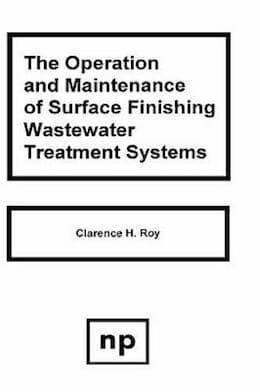
Curated with aloha by
Ted Mooney, P.E. RET

The authoritative public forum
for Metal Finishing 1989-2025

-----
Nickel precipitation seems affected by mixing with treated cyanide
Q. Have two separate wastewaters of nickel and gold cyanide. The cyanide wastewater is collected. Bleach (NaClO) ⇦ bleach/sodium hypochlorite in bulk on eBay or Amazon [affil links] and caustic (NaOH) is added for cyanide destruct. This treated wastewater then overflows into a nickel wastewater collection tank. The nickel wastewater is adjusted upward (NaOH) for metal precipitation before floc and polymer. Can the nickel metal precipitation rate be effected by the addition of the bleached cyanide wastewater?
Andy Alinghelectronics plating - Kansas City, Kansas, USA
2003
by Clarence Roy

on AbeBooks
or eBay or
Amazon
(affil links)
A. There may be a semantics issue here, Andy. Settling rates are definitely adversely affected by an excess of chlorine, although I haven't heard that this can affect the actual precipitation rate.
Remember that nickel requires a rather high pH for precipitation (say 10-10.5 for starters), so you can't expect much precipitation until the pH gets pretty well up there.

Ted Mooney, P.E.
Striving to live Aloha
finishing.com - Pine Beach, New Jersey
2003
A. I agree with Ted, there seems to be some semantics issues here. By the term rate, are you regarding the settling rate of the floc, or the quantity of nickel actually precipitating? If it is the quantity of nickel, then the nickel could be complexed by the untreated cyanide. It sounds as though you are running a continuous cyanide treatment versus batch treatment. It is imperative to ensure proper retention time in both of the two stages of cyanide reduction. If your question is in regard to the floc not settling, please clarify what you see to question the process. If it is floc coming through a lamella clarifier, then it is possible to have too high a flow rate or you are not removing enough solids from the sludge blanket.
Best of Luck.
Kansas City, Missouri
2003
Q. Dear Ted,
Thanks for the follow-up to my question. We are finding that ppm of nickel is greater when chlorinated cyanide is mixed with a high pH (10.5) nickel effluent. Why does nickel metals not want to drop out when chlorinated cyanide water is present?
- Kansas City, Kansas
2003
A. I apologize but we're still having that same semantics issue, Andy. When you say "drop out", do you mean precipitate or do you mean settle? What you perhaps want to do is take a sample after neutralization, and filter it and analyze the amount of nickel in the filtrate so you can tell us whether the nickel is remaining dissolved in the solution, or whether it is precipitating but not settling out. Failure to precipitate may indicate untreated cyanide complexing the nickel, whereas a failure to settle may mean excessive chlorine; in a way, these are sort of opposites. Thanks!

Ted Mooney, P.E.
Striving to live Aloha
finishing.com - Pine Beach, New Jersey
2003
Q. Dear Ted and Ira,
Sorry about the confusion. The nickel metals are lacking "settling" rates. Precipitation is adequate we just can't get enough nickel to "settle out" before it's time.
- Kansas City, Kansas
2003
A. It could be that your getting a complex formed by either the presence of ammonia (pH too low in CN destruction) or you may not actually be getting the CN destructed as much as you want or believe. CN loves nickel! If your just trying to raise the pH with caustic, and these complexation agents are present, the nickel will not precipitate as well as if you do not mix them together. You don't mention whether you are trying to use a 2 stage destruct on the CN or not. This could be an improvement.
Is it possible to keep the treatments segregated until your discharge or final pH tank instead of co-mingling them? You can't have much, if any, solids in a gold cyanide rinse ... can you?

Tom Baker
wastewater treatment specialist - Warminster, Pennsylvania
2003
![]() Tom,
Tom,
Thanks for the info. We've decided to keep both wastewater streams (CN and Ni) separated and bring back together at the final pH adjustment. There seems to be no apparent reason why we should blend the two wastewater streams together since the CN stream does not contain any metals and therefore does not need to go through the nickel metal precipitation process.
- Kansas City, Kansas
2003
A. Is the solid you are obtaining a nickel oxide? I am trying another method to get the nickel out and I find myself with a very unstable substance. So I believe it is constantly reacting without finding an equilibrium, exchanging oxygen for hydroxide. The hydroxide group is polar so it may be keeping your nickel from dropping.
Dan Joita- Oradea, Bihor, Romania
December 5, 2008
Q, A, or Comment on THIS thread -or- Start a NEW Thread